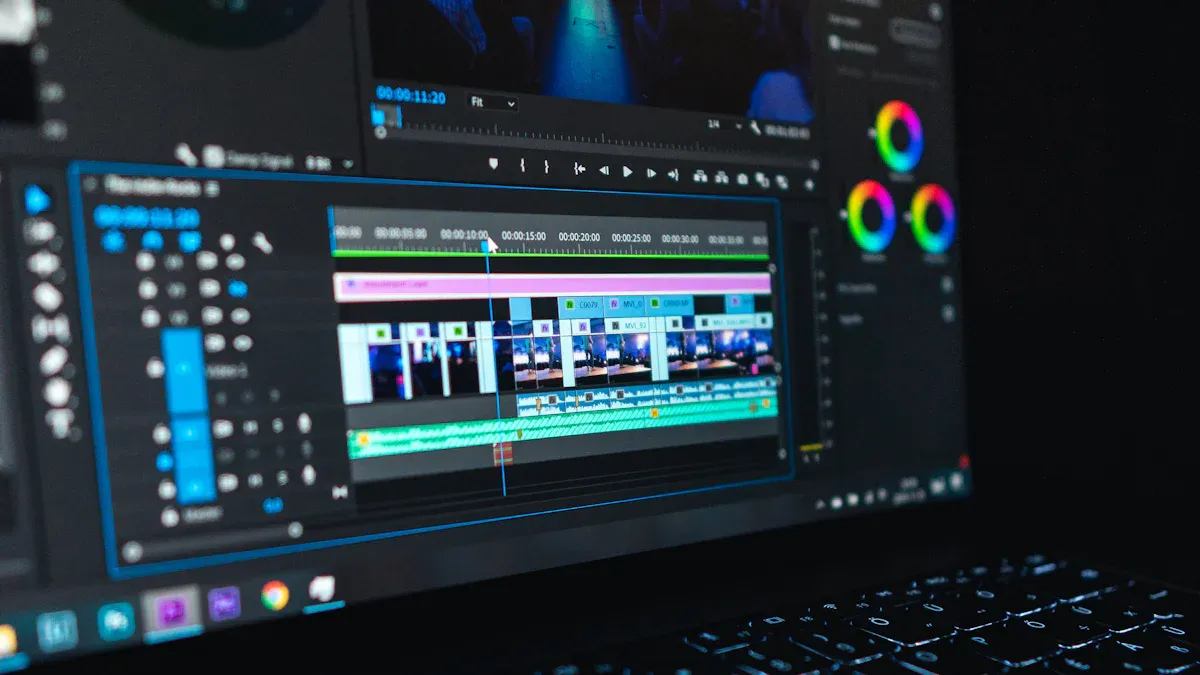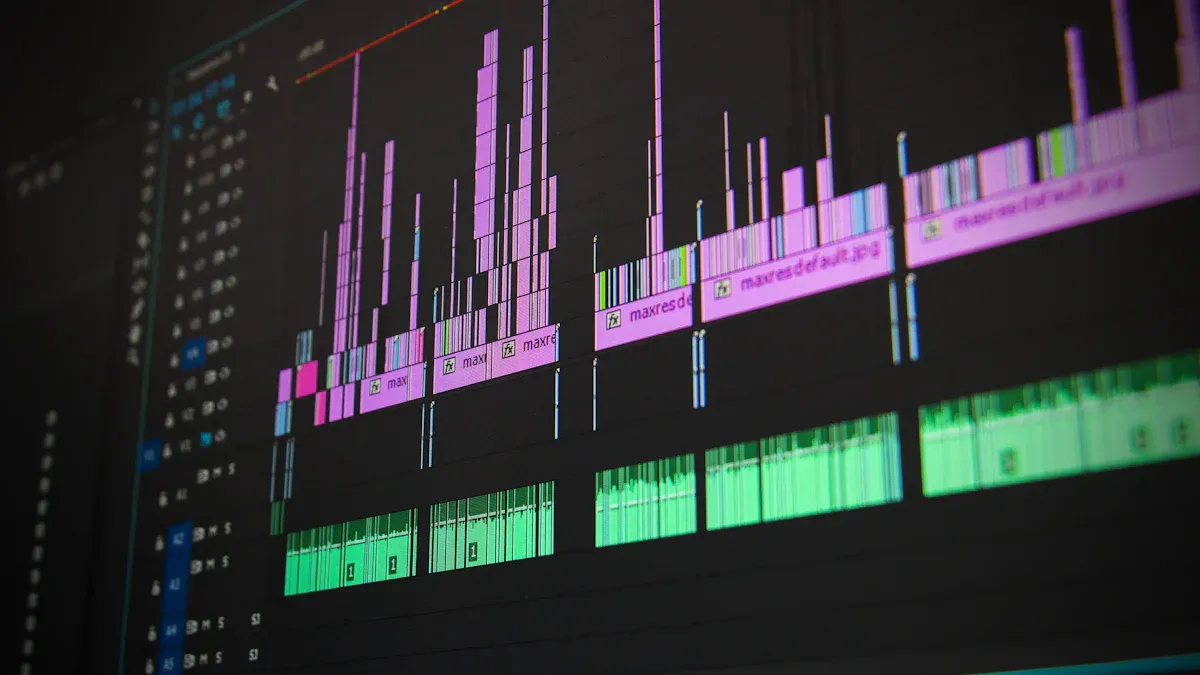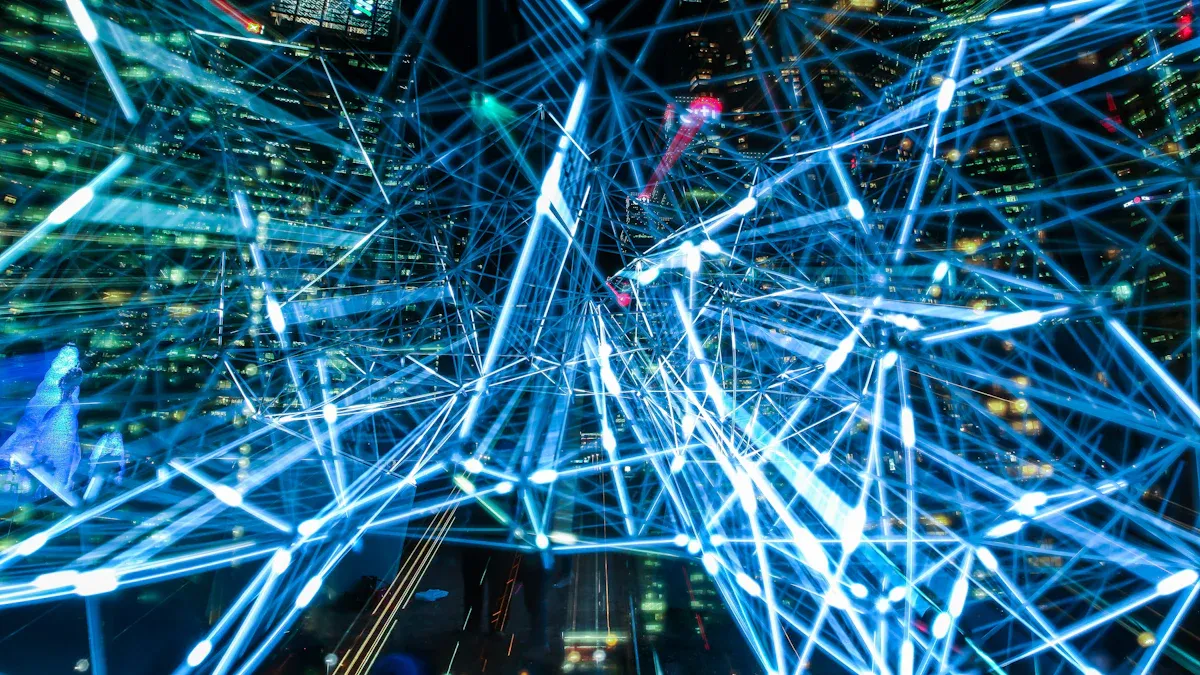Development of AI Video Enhancement Tools

AI video tools are changing how videos are made and edited, significantly enhancing AI推动创作者生产力. These tools use smart tech like machine learning and computer vision, making your work easier and faster. Imagine fixing blurry videos or shaky clips with just a few clicks. That’s how powerful AI is.
Here’s why these tools are important:
They make video editing simple, allowing you to create great content.
They save time and effort for people making videos.
They enable you to produce pro-level videos without pricey gear.
AI also utilizes fake data to plan tricky shots and train editing models, which lowers costs and improves the quality of your videos. With AI helping creators, you can focus on ideas while the tools handle the hard work.
Key Takeaways
AI video tools make editing easy, helping anyone create great videos fast.
These tools save time by doing boring tasks automatically, so creators can focus on ideas.
AI improves video quality by fixing problems like blur and noise, making videos look better.
Using AI lowers costs and time, making video creation easier for everyone.
The future of AI in video editing will bring faster processing and custom features, boosting creativity.
AI's Role in Video Enhancement

Machine Learning and Computer Vision in Video Editing
Video editing is now quicker and smarter than before. This is because of machine learning and computer vision. These tools study your videos frame by frame. They find objects, movements, and lighting changes. Imagine software fixing shaky clips for you automatically. That’s the power of AI.
Machine learning studies video patterns to find and fix problems. It improves videos without needing your input. Computer vision goes further by recognizing faces, places, or text. Together, they make editing faster and more accurate. You no longer need to adjust every small detail. AI tools do the hard work, so you can focus on making fun videos.
How AI Analyzes and Enhances Video Content
AI doesn’t just edit—it changes videos completely. It checks every pixel to see what needs fixing. For example, it sharpens blurry parts or removes noise. AI tools also adjust colors and lighting to make videos look amazing.
Here’s what AI can do:
Feature | What It Does |
|---|---|
Faster Editing | AI speeds up editing, saving you lots of time. |
Better Accuracy | It spots objects and actions perfectly for great results. |
New Features | AI adds cool tools like live analytics and auto-editing. |
Useful Insights | It finds helpful info in videos for fields like healthcare. |
These features make AI a big deal for video editing. Whether it’s a short clip or a movie, AI tools make editing easier and better.
The Role of Data in Training AI Models
AI gets better at editing by learning from good data. It needs many types of videos to learn well. These videos teach AI to spot patterns and improve edits. Tools like MSE and SSIM check how well AI works.
Tool | What It Measures |
|---|---|
MSE | Finds the average difference between real and edited frames. |
SSIM | Checks how changes affect the video’s structure. |
PSNR | Compares video quality to background noise. |
But training AI isn’t always simple. Finding enough videos and keeping privacy safe are challenges. Researchers organize video collections to make better datasets. With better data, AI tools can create even more amazing results.
How AI Helps Creators Work Faster
Making Repetitive Video Editing Easier
Editing videos takes a lot of time. Doing the same tasks again and again can be boring. AI tools help by doing these jobs for you. This lets you focus on being creative. For example, tools like Descript let you edit videos by changing the text. You can cut or move clips without using a timeline.
AI also removes filler words and fixes background noise. You don’t need to find every “um” or “uh” yourself. AI does it quickly. These tools save time and make editing easier.
Speeding Up Work with AI Tools
AI doesn’t just make editing faster. It changes how you work. Tools like Overdub can copy your voice. This helps fix mistakes without recording again. AI platforms also make teamwork simple. Teams can edit and finish projects together from anywhere.
Here’s how AI helps different creative jobs:
Creative Job | How AI Helps | Time Saved |
|---|---|---|
Graphic Design | Makes design options faster | |
Writing | Speeds up editing | Boosts work by 35% |
Video Editing | Automates hard tasks | Cuts time by 50% |
AI saves time and effort. This gives you more time to create new ideas.
Creating Content Faster with AI
AI makes creating content much quicker. Tasks that took weeks now take hours. For example, translating videos for other languages is faster. This helps you share content sooner and stay ahead.
AI tools also help make captions, suggest edits, or write scripts. These tools let you create great content easily. AI doesn’t just save time. It helps you make more and better content faster.
Practical Applications of AI Video Enhancement

Film and Television Production
AI is changing how movies and TV shows are made. It handles boring tasks like fixing colors and matching scenes. This gives creators more time to focus on stories. AI can also read scripts and suggest how to shoot scenes. This helps directors plan better.
During production, AI speeds up work by automating tasks. For example, it creates captions or improves video quality instantly. This saves both time and money. More people are using AI in video production now. In 2024, only 18% used it, but by 2025, 41% did. That’s a huge 127.78% increase, showing how AI helps creativity grow.
Metric | 2024 Value | 2025 Value | Improvement (%) |
|---|---|---|---|
Use of AI in Video Production | 18% | 41% | 127.78% |
Use of AI Captions | N/A | 60% | N/A |
Increase in Caption Usage | N/A | 572% | N/A |
AI also makes videos easier for everyone to enjoy. It adds captions and creates content that fits each viewer. Whether it’s a big movie or a small web series, AI tools help you make great videos with less effort.
Social Media Content Creation
Social media needs fun and engaging videos. AI makes creating them simple. You can use AI to edit videos, add captions, and pick the best posting times. Short videos under one minute are most popular, with 50% engagement. AI can help make these videos even better.
AI also studies how viewers react to your videos. It finds the most interesting parts and suggests ways to improve. This helps you make videos your audience will love. Marketers say putting calls-to-action (CTAs) early in short videos boosts results by 40%.
AI doesn’t just help with editing. It also makes planning and finishing videos easier. This gives you more time to be creative. With AI, you can create amazing videos faster and stay ahead in social media.
Educational and Training Videos
AI is changing how learning videos are made and shared. It lets you create training videos 90% faster than before. Over 200 videos can be made in less than six months. AI also saves money, cutting costs by $1,500 per worker each month.
Evidence Type | Description |
|---|---|
Efficiency | AI-generated videos were created 90% faster than traditional methods. |
Cost Savings | Monthly savings of up to $1,500 per employee were reported. |
Learning Outcomes | Participants completed training 20% faster with no negative impact. |
Engagement | A 30% increase in learning engagement was achieved through AI videos. |
AI makes learning better by personalizing videos. It adjusts content to match different learning styles. This makes training more effective. AI can also add subtitles or translate videos for global audiences. With AI, learning videos are faster to make and more exciting to watch.
Challenges and Limitations of AI Video Tools
High Computational Costs and Resource Demands
AI video tools are strong but need many resources to work. To process videos quickly, you need advanced hardware like GPUs or TPUs. These can be very costly. Sometimes, cloud services are also needed to handle the workload. This makes it harder for small creators or businesses to afford.
Here’s why these tools use so many resources:
Processing large video files takes a lot of energy.
Special hardware is often required, which raises costs.
It’s also hard to balance speed with quality. Smart algorithms are needed to make videos fast without losing detail.
Challenge | Description |
|---|---|
Data Quality and Availability | Good datasets are needed for training, but they’re hard to find. |
Computational Requirements | |
Real-time Processing Constraints | Algorithms must be fast and accurate for quick results. |
Ethical Concerns and Potential Misuse
AI tools can do great things, but they bring risks too. For example, people might use them to make fake or harmful videos. Deepfakes are one way AI can be misused.
Privacy is another big issue. AI needs lots of data to learn, and this data might include private details. If not handled carefully, it could break privacy rules.
To use AI safely, think about how your work affects others. Make sure your videos won’t harm anyone or be used in bad ways.
Tip: Always check where your data comes from and follow privacy rules.
Limitations in Handling Complex Scenarios
AI tools are smart but not perfect. They can’t handle tricky editing tasks that need human skills. For example, adding an object to a video might not look natural with AI alone.
Here are some common problems:
Challenge | Description |
|---|---|
Ambiguity of Language | Text prompts can’t always explain unique details. |
Scarcity of Training Data | |
Spatiotemporal Consistency | Keeping objects moving naturally in videos is hard for AI. |
These limits mean you might still need to edit videos yourself. AI can save time, but it can’t replace human creativity completely.
Future Trends in AI Video Enhancement
Real-Time Video Processing Advancements
Think about editing videos while recording them. Real-time video processing makes this possible. AI checks and improves videos instantly. You don’t need to wait for hours anymore. Results now come in just seconds.
AI tools can handle long videos, from short clips to movies. They also manage hard tasks like tracking objects or guessing actions. These updates make your work quicker and smarter.
Feature | Description |
|---|---|
Longer Video Handling | Works with videos from seconds to 1.5 hours. |
Complex Task Management | Tracks objects and predicts movements in scenes. |
Real-World Data Use | Uses live-stream data to mimic real-life situations. |
These changes let you focus on being creative. AI takes care of the hard technical parts. Real-time processing is a big step for faster and smarter video editing.
Integration with AR/VR Technologies
AI and AR/VR are working together to create cool experiences. Imagine entering a virtual world that feels real. AI makes these worlds look sharp and interact with you personally. It even changes content based on what you like.
Here’s how AI improves AR/VR:
Builds realistic, moving environments.
Speeds up character creation and story writing.
Changes content quickly based on user feedback.
Adjusts for different devices and user needs.
But there are still problems. These tools need strong computers and skilled workers. Privacy and ethics are also concerns. Even with these issues, AI and AR/VR are shaping the future. They make work faster and more productive.
Personalized and Adaptive Video Editing
What if your editing tools knew your style? AI makes this happen with smart, adaptive editing. These tools learn from your past work. They suggest edits that match your taste. They also adjust for different viewers, making your videos connect better.
Generative AI helps a lot here. It creates special effects, smooth transitions, and even full scenes. This saves time and boosts creativity. With AI, you can make videos that feel unique and professional while working faster than before.
AI video tools are helping creators make better videos easily. They save time and effort while improving video quality. These tools let anyone create great content without needing costly gear.
Note: Though challenges like high prices and ethical issues remain, AI’s potential is huge.
The future is exciting. As AI improves, tools will get even stronger. You’ll be able to turn your ideas into amazing videos with less work! 🚀
FAQ
What are AI video enhancement tools?
AI video tools use smart tech to improve videos. They fix blurry parts, steady shaky clips, and brighten colors. These tools make editing faster and simpler for everyone.
How do AI tools benefit creators?
AI tools save time by doing boring tasks like fixing noise or colors. They help creators focus on ideas and stories instead of small details.
Can beginners use AI video tools?
Yes! AI tools are easy for everyone to use. Even beginners can make great videos without knowing advanced editing. These tools make hard tasks simple.
Are AI tools expensive for creators?
Some tools cost a lot, especially with special hardware. But many cheap or free tools are available. They work well for small projects or personal use.
What’s the future of AI video tools for creators?
The future is exciting! AI tools will get better with real-time edits, custom features, and AR/VR. These updates will help creators make amazing videos faster and easier.
See Also
AI Innovations Transforming The Future Of Data Analysis
Best 10 AI Solutions For Data Analytics In 2025
Leading AI Technologies Reshaping Data Analytics This Year
